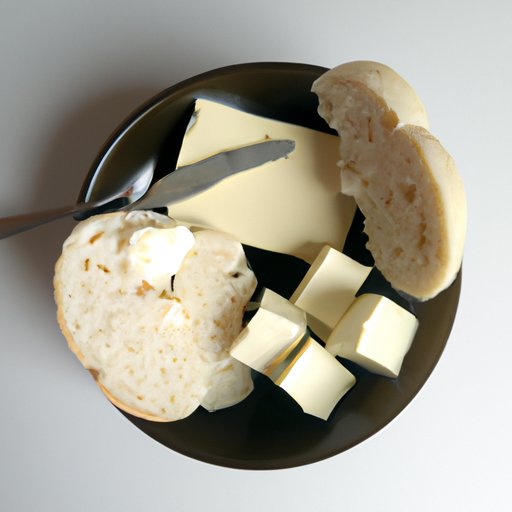
Introduction
Pregnancy is a special time when expectant mothers must take extra care with their diets to ensure the health and well-being of their developing babies. Many foods that are normally safe to eat may pose risks during pregnancy. One such food is cream cheese, which is often enjoyed as a spread or ingredient in various dishes. In this article, we’ll explore whether it’s safe to eat cream cheese during pregnancy and offer tips for navigating the potential risks and benefits of this creamy treat.
Benefits of Cream Cheese Consumption During Pregnancy
Cream cheese is a dairy product that contains several important nutrients that can benefit both the mother and the developing baby. For example, cream cheese is high in calcium, which is essential for growing strong bones and teeth. Calcium can also help regulate blood pressure and prevent preeclampsia, a potentially dangerous condition that can develop during pregnancy.
Cream cheese is also a good source of protein, which is important for building and repairing tissues. Protein can also help keep the mother’s muscles and organs healthy and support the growth and development of the baby.
Risks Associated with Eating Cream Cheese While Pregnant
While cream cheese can provide important nutrients during pregnancy, it can also pose certain risks. One of the main risks associated with cream cheese consumption during pregnancy is the potential for listeria contamination.
Listeria is a type of bacteria that can cause a serious infection called listeriosis. Listeria can be found in various foods, including certain types of soft cheeses such as feta, brie, and queso blanco. While most types of cream cheese are safe to eat during pregnancy, certain varieties that are made with unpasteurized milk or that have added ingredients like herbs or smoked salmon can also pose a risk of listeria contamination.
Listeriosis can be especially dangerous for pregnant women, as it can cause miscarriage, stillbirth, premature delivery, or severe illness in the newborn baby. Symptoms of listeria infection may include fever, muscle aches, and gastrointestinal issues like nausea and diarrhea.
Healthy Alternatives to Cream Cheese for Expectant Mothers
If you’re pregnant and looking for safe and healthy alternatives to cream cheese, there are several options to choose from. Some of the best alternatives include Greek yogurt, cottage cheese, and hummus.
Greek yogurt is a great source of protein, calcium, and probiotics, which can support digestion and overall health. Cottage cheese is also a good source of calcium and protein, and it’s low in fat. Hummus is a delicious and nutritious spread that’s made from chickpeas, which are rich in fiber, protein, and several important vitamins and minerals.

Cream Cheese Safety Measures for Pregnant Women
If you’re a pregnant woman who enjoys cream cheese, there are a few safety measures you can take to reduce your risk of listeria contamination. First, be sure to only consume cream cheese products that have been pasteurized, as this process can kill harmful bacteria like listeria.
Next, avoid cream cheese products that contain added ingredients like herbs, spice blends, or smoked salmon, as these products may pose an increased risk of listeria contamination. Be sure to also check expiration dates and storage instructions on cream cheese products, and refrigerate them promptly after opening.
Frequently Asked Questions About Cream Cheese and Pregnancy
Here are some common questions that pregnant women may have about cream cheese consumption:
Can I eat flavored cream cheese while pregnant?
Flavored cream cheese products may contain added ingredients that could pose a risk of listeria contamination, so it’s generally best to avoid them. Stick to plain, pasteurized cream cheese products to reduce your risk of infection.
Is it safe to eat cream cheese while breastfeeding?
In general, cream cheese is considered safe to eat while breastfeeding as long as it’s pasteurized and consumed in moderation. If you have concerns about your cream cheese consumption while breastfeeding, talk to your healthcare provider.
Can I have cream cheese on a bagel during pregnancy?
As long as the cream cheese is pasteurized and consumed in moderation, it’s generally safe to enjoy cream cheese on a bagel during pregnancy. However, be sure to avoid cream cheese products that contain added ingredients like herbs or smoked salmon, as these can pose an increased risk of infection.
Nutritional Value of Cream Cheese During Pregnancy
Cream cheese can provide several important nutrients during pregnancy, including calcium, protein, and vitamin D. Calcium is important for building strong bones and teeth in the developing baby, as well as regulating blood pressure and preventing preeclampsia in the mother. Protein is essential for building and repairing tissues, supporting muscle and organ health, and promoting the growth and development of the baby.
Cream Cheese Recipes for Pregnant Women
If you’re a pregnant woman looking for delicious and safe cream cheese recipes, here are a few ideas:
- Mini bagels with plain cream cheese and sliced strawberries
- Whole-grain crackers with low-fat cream cheese and cucumber slices
- Vegetable wraps with hummus, roasted red peppers, and plain cream cheese
- Baked sweet potato with low-fat cream cheese, chopped pecans, and a drizzle of honey
When preparing these recipes, be sure to use pasteurized cream cheese and avoid adding any ingredients that may pose a risk of listeria contamination.
Conclusion
Cream cheese can provide important nutrients during pregnancy, but it can also pose certain risks due to the potential for listeria contamination. By following the safety measures and healthy alternatives outlined in this article, expectant mothers can make informed decisions about their cream cheese consumption and support a healthy pregnancy.




